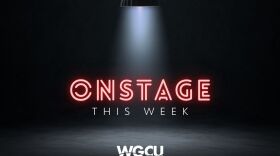ARI SHAPIRO, HOST:
The migrants at the U.S.-Mexico border were on Marianne Budde's mind when she sat down to write her Christmas Eve sermon. She's bishop of the Episcopal Diocese of Washington. And when she delivered that sermon last night at the Washington National Cathedral, some surprise guests were in the audience. President Trump and first lady Melania Trump had been scheduled to be in Florida, but the government shutdown kept them in Washington. So they were sitting in the pews when the bishop gave this interpretation of the Christmas story.
MARIANNE BUDDE: There are social implications. The story's very clear about this. It begins as you heard tonight. It begins with an emperor who could move people around on a whim. And two people were forced to obey the emperor's edict, and they set out on a long, arduous journey in the last month of the young woman's pregnancy. And they were denied a place of comfort in the hour of her greatest need, and she had no choice but to lay her child in the trough reserved for animals.
SHAPIRO: Earlier today, I reached Bishop Marianne Budde at the airport, and she told me she couldn't ignore parallels between the story of Mary and Joseph and the present day.
BUDDE: As the story goes, were forced by an emperor's decree to move from one place to another, which is why she gave birth in Bethlehem. And shortly after his birth, as the story's told, they had to flee the fear of violence and find refuge in another country. So the text could not be more clear that the priorities of God are with us all when we are in those places of greatest hardship and need and that as Christians, as followers of Jesus, as one of our great mantras of the church says, in the name of these refugees, we are to help all refugees.
I didn't explicitly mention any of the immigrant crises that are facing us, although I was just at the U.S.-Mexican border a few days ago and can't get those images out of my mind. But I didn't have to. It was the text that called that to us, and I simply touched upon it pretty lightly, actually, at the end of the sermon. But it's an unmistakable part of the story.
SHAPIRO: Of course, President Trump was scheduled to be at his Mar-a-Lago estate in Florida and is only in Washington because of the shutdown. So you must not have anticipated that he would be there.
BUDDE: No, no. We didn't know that either the Pences, who were at the first service, or the Trumps were coming to the later service until - I mean, I found out 15 minutes before the first service.
SHAPIRO: As you talked about migrants and refugees, as you talked about nationalism, could you see any reaction from the president?
BUDDE: No. No, no. And I wasn't - to be honest, I wasn't looking. Apart from my mother, who was sitting in the front row, across on the other side...
SHAPIRO: (Laughter).
BUDDE: ...I try not to focus on other people.
SHAPIRO: Yeah.
BUDDE: Other than that, I try to look, actually, to the farthest part of the room so that the people in the back know that I am equally speaking to and for them.
SHAPIRO: I'm sure there are a lot of people in this country who would like to be able to have the president's undivided attention for as long as you spent delivering that sermon. Do you feel like you delivered the message that you wanted him to hear, even though you had many purposes beyond just speaking to the president in this one sermon?
BUDDE: Again, I've learned in preaching that it's dangerous to use a sermon to get a point across to a specific person like that. That makes it more of an agenda-laden message than I think is true to the art or the craft of preaching. I hope he heard what I wanted everyone to hear. I don't think I changed his mind on the issues about which he and I would disagree because most of us come into a sermon or any other encounter with our biases fully in place. But one never knows.
I hope that all of us - I mean, it wasn't just for the president. It's for all of us. I mean, we have a responsibility. And we have infinite ways that we can respond. And so that's what I hope he and everyone heard.
SHAPIRO: Does delivering the Christmas sermon still make you nervous? I imagine for most people, something that high-profile would be (laughter) really nerve-wracking.
BUDDE: It is. It is. It's so humbling. So very humbling. And some years you feel like, as I've often said, you know, it's like baseball. You know? You go up to the bat and you swing. And you give it your best and you try to offer what is in your heart and what's in the, you know, the essential message of the moment, and then you leave the rest in God's hands. As someone once said to me, there's a lovely gap between the preacher's mouth and the listeners' ears, and you pray that the spirit does what the spirit can do.
SHAPIRO: Marianne Budde, thank you so much for speaking with us, and merry Christmas to you.
BUDDE: Thank you. Thank you so much, Ari. I really appreciate talking with you today.
SHAPIRO: She's bishop of the Episcopal Diocese of Washington, speaking with us now from the airport. She delivered the Christmas Eve sermon last night at Washington National Cathedral, where President Trump and Vice President Pence attended services. Transcript provided by NPR, Copyright NPR.
NPR transcripts are created on a rush deadline by an NPR contractor. This text may not be in its final form and may be updated or revised in the future. Accuracy and availability may vary. The authoritative record of NPR’s programming is the audio record.







